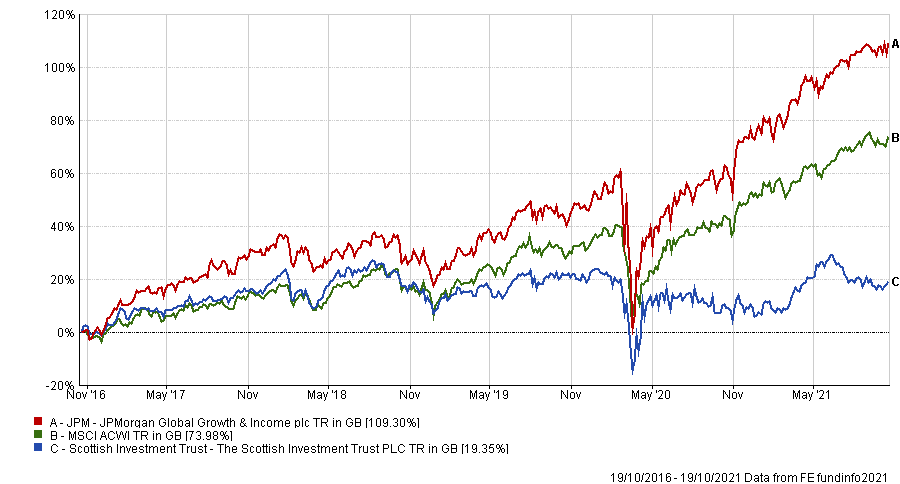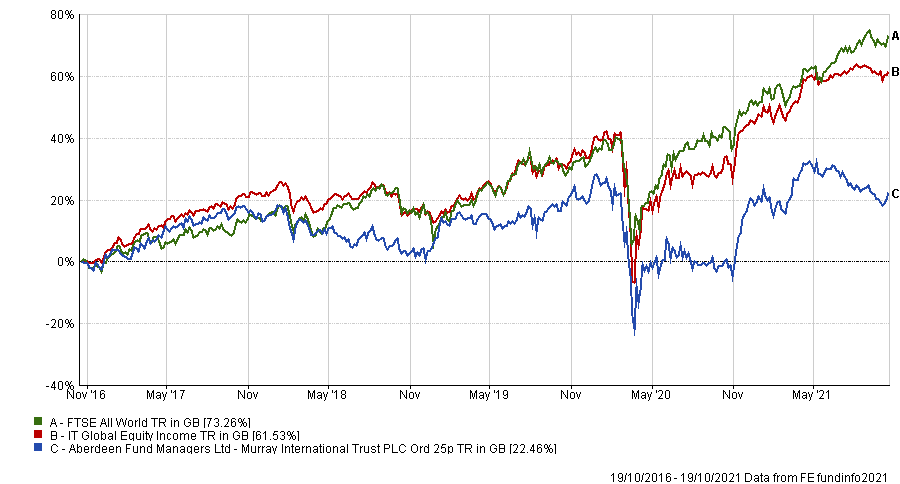The proposed merger between the Scottish Investment Trust and JPMorgan Global Growth & Income trust has been positively received by investment analysts, but some may wish to leave for a more appropriate alternative.
Yesterday the board of the £490m Scottish trust announced plans to merge with the JP Morgan portfolio, creating a £1.2bn company.
Simon Elliott, research analyst at Winterflood Securities Limited, said the JPMorgan investment company was a “highly suitable partner”, noting that the latter trust’s performance has been strong.
Indeed, over the past five years the trust has made investors 109.3% compared with a 74% gain for the MSCI All-Countries World index and a 19% return from the Scottish Investment Trust. It has also outperformed over 10 years.
Performance of trusts vs benchmark over 5yrs

Source: FE Analytics
“Furthermore, we believe that its enhanced dividend policy, which pays out 4% of net asset value (NAV) each year through quarterly dividends, allows shareholders to ‘have their cake and eat it’,” said Elliott.
He added that the new trust would have “broad appeal” and that the merger was a “positive development for shareholders in both Scottish Investment Trust and JPMorgan Global Growth & Income”.
Ewan Lovett-Turner, director at Numis Securities, agreed, noting that JPMorgan was a “safe pair of hands”, being an established manager in the investment companies sector with the resources to promote the fund.
The trust, managed by the team of Timothy Woodhouse, Helge Skibeli and Rajesh Tanna, is trading on a premium and has been issuing new shares to meet demand, reflecting that it is already popular with investors.
“In addition, both sets of investors will benefit from lower costs and we believe is vital for equity-focused strategies to be cost competitive given current investor sentiment towards fees,” he said, which are to reduce by 11 basis points.
The shares of the Scottish Investment Trust rose on the back of the news, up 6.2%, although this was still a wide discount to the underly value of its holdings, or NAV.
David Johnson, analyst at Kepler Trust Intelligence, said investors should “buy” the JP Morgan Growth & Income trust as a result.
“There are far worse places investors of Scottish Investment Trust (SCIN) could end up than JPMorgan Global Growth and Income,” he said.
However, he noted that the trusts are very different from one another. Under Alasdair McKinnon, the Scottish Investment Trust has had a strong value bias, buying unloved companies that he believed were ready to rebound.
Meanwhile, the JPMorgan Global Growth & Income trust is run with a broader remit, investing in companies that the managers believe are “best-ideas”, whether they be classed as value or growth.
Importantly, the team buy companies that can deliver long-term earnings growth and are in industries that are going through structural change. They also need to be trading on attractive valuations.
Mick Gilligan, head of managed portfolio services at Killik & Co, said it could be a “sad day” for some investors, as “another dividend hero bites the dust”. Indeed, Scottish IT had increased its dividend for 37 consecutive years.
He said that investors that have made money from the trust over the long-term will likely stick with the new trust rather than taking any potential tax hit from selling, but noted that for others, there is a real risk with the new mandate.
This is that, after a difficult past decade, a strong resurgence in value names could leave investors worse off in the new trust than they would have been under McKinnon.
“If you were in the trust for a value bias you are better off in something like Murray International, which has a similar progressive dividend policy,” said Gilligan.
Performance of trust vs benchmark over 5yrs

Source: FE Analytics
“It is hard to think of another global trust with a value bias that is also pretty liquid and that has a decent dividend yield. It ticks all of the boxes.”
As part of the deal, investors will also need to look for the costs of the current pension scheme and sale of the property as part of the liquidation, something that Lovett-Turner said will require “clarity”.





